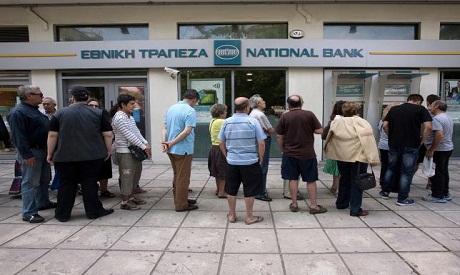
People line up to withdraw cash from a National Bank ATM in Thessaloniki, Greece June 27, 2015. (Photo:Reuters)
The Sun, as always, is shining. The seas are a tempting blueish-green. The cafes are thronged.
But beneath this carefree image, Greece is on edge, anxious to know how its future will play out in Europe's halls of power.
"We still don't know what will happen tomorrow. Can we expect something better, or is it Armageddon?" asked Vassilis Papoutsoglou, queueing at an ATM in Athens for his daily ration of cash.
"Tomorrow" will be Sunday, when EU leaders are expected to pass judgement on a last-ditch bailout request Greece has submitted in return for reforms it had until then been fiercely resisting.
The outcome could unlock a rescue worth billions of euros.
Or it could lead to near-certain financial collapse and possible exit from the eurozone.
"Like all Greeks I am feeling a little confused by the situation," said Papoutsoglou, 52, who works in his brother's shop.
"We will have to wait to see who has been telling the truth."
Many Greeks feel betrayed that their 'No' vote in a referendum a week ago to more austerity has been dismissed by the government of Prime Minister Alexis Tsipras.
But even more want to ensure they don't lose the euro and return to the drachma, which was notoriously weak and unstable.
Visitors to central Athens might be surprised to see a modern, clean capital whose many outdoor cafes are full, and roads teem with gleamingly expensive cars and motobikes.
There is little outward sign of distress, beyond some ragged people begging or rooting through trash containers.
And the fact that there's 26-percent unemployment means many working-age Greeks have little to do other than socialise under the Mediterranean Sun.
Some have brought cynical humour to bear on an unbearable situation, using social networks to exchange jokes. On Instagram, for instance, some Greek users are posting mock-up photos of old drachma notes with their faces on them.
But scratch the surface and even middle-class Greeks -- many of whom have stashed hard euro cash at home -- are finding the going tough.
Banks remain closed. ATM withdrawals are capped at 60 euros ($67) a day. Money transfers abroad are blocked. Some supermarket shelves are empty. Imported medicines and goods are drying up.
"We can't live like this, without knowing what will happen tomorrow," said Marilena Mouzaki, a pregnant 35-year-old mother pushing her 11-month-old son in a baby carriage.
Mouzaki was among the 39 percent of voters who a week ago voted to stay in the eurozone with a 'Yes' vote that was soundly trounced.
"When I go to the supermarket they don't have many foods, even milk for the baby, the pharmacies don't have any more (medicine)," she said.
Some of the uncertainty gripping the country also stems from domestic politics.
Tsipras's concessions to creditors is being seen as capitulation in many quarters, not least among supporters of his radical left Syriza coalition.
The centrist daily Ethnos said there was "simmering conflict" within Syriza.
It and Greek Twitter users predicted a showdown in the party, followed by resignations, perhaps even that of Tsipras.
The conservative Ta Nea newspaper said Tsipras had won an agreement but at the cost of his party's trust.
"Reshuffle, new alliances or elections?" it asked.
Dread and fatigue born of months of squabble have produced a surreal mood in Greece this weekend.
And for many Greeks, it is all too much.
So they escape as best they can while matters are being decided for them. They head to the country's multitude of beaches and islands. Europe or no, the Sun is still shining.
Short link: